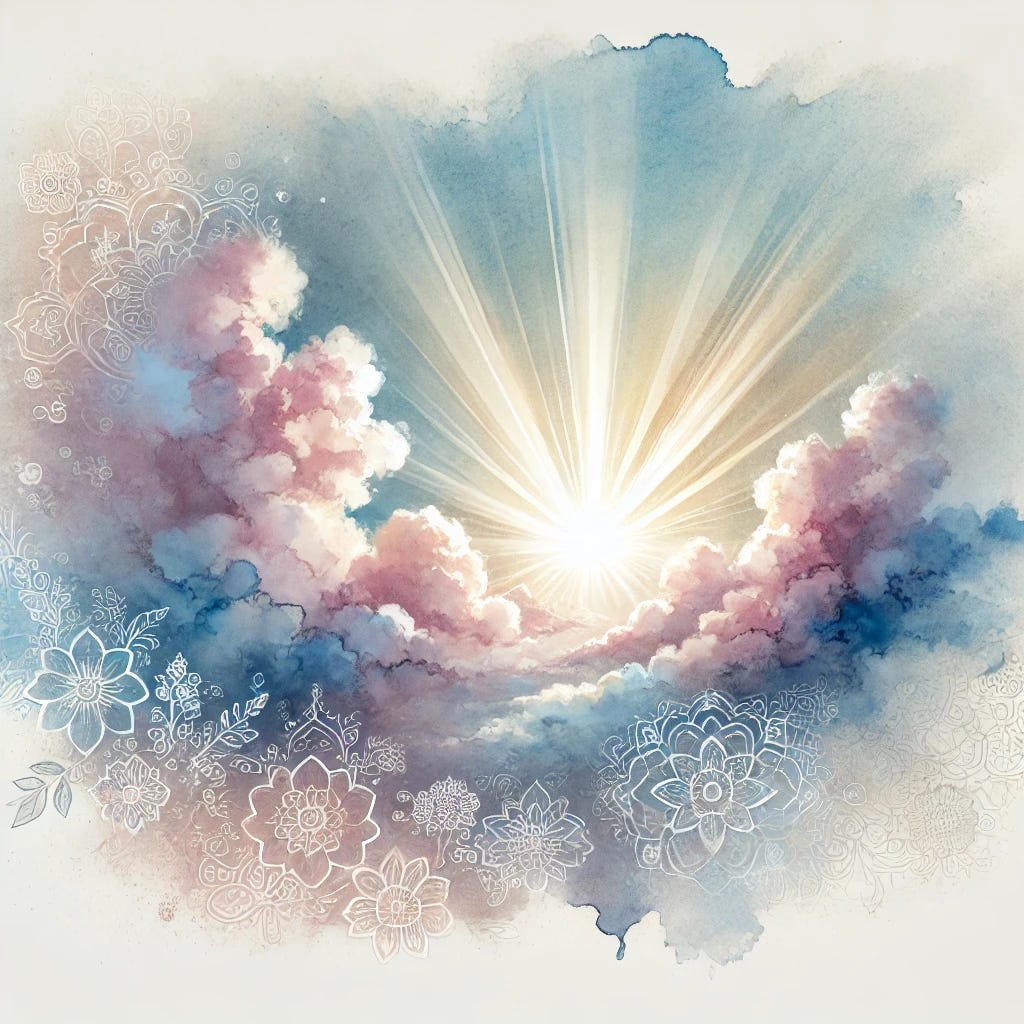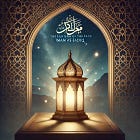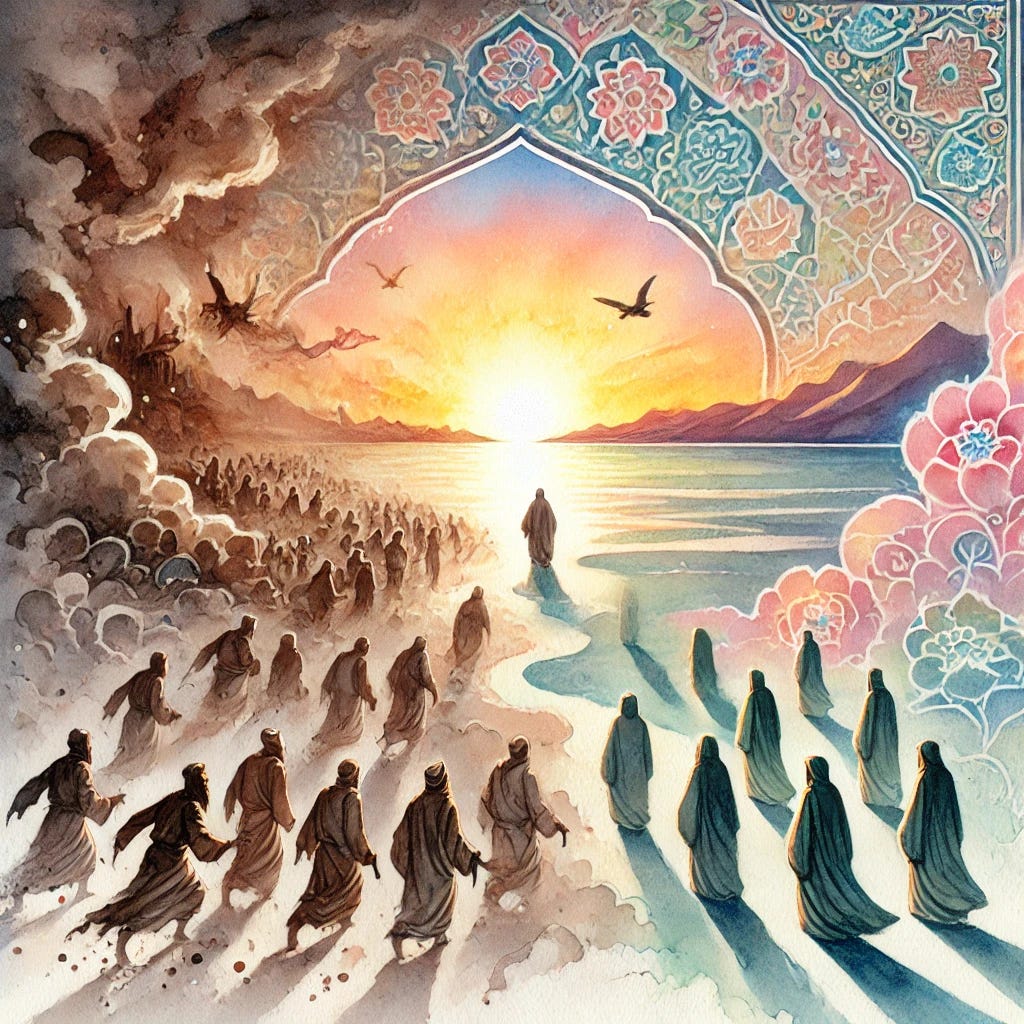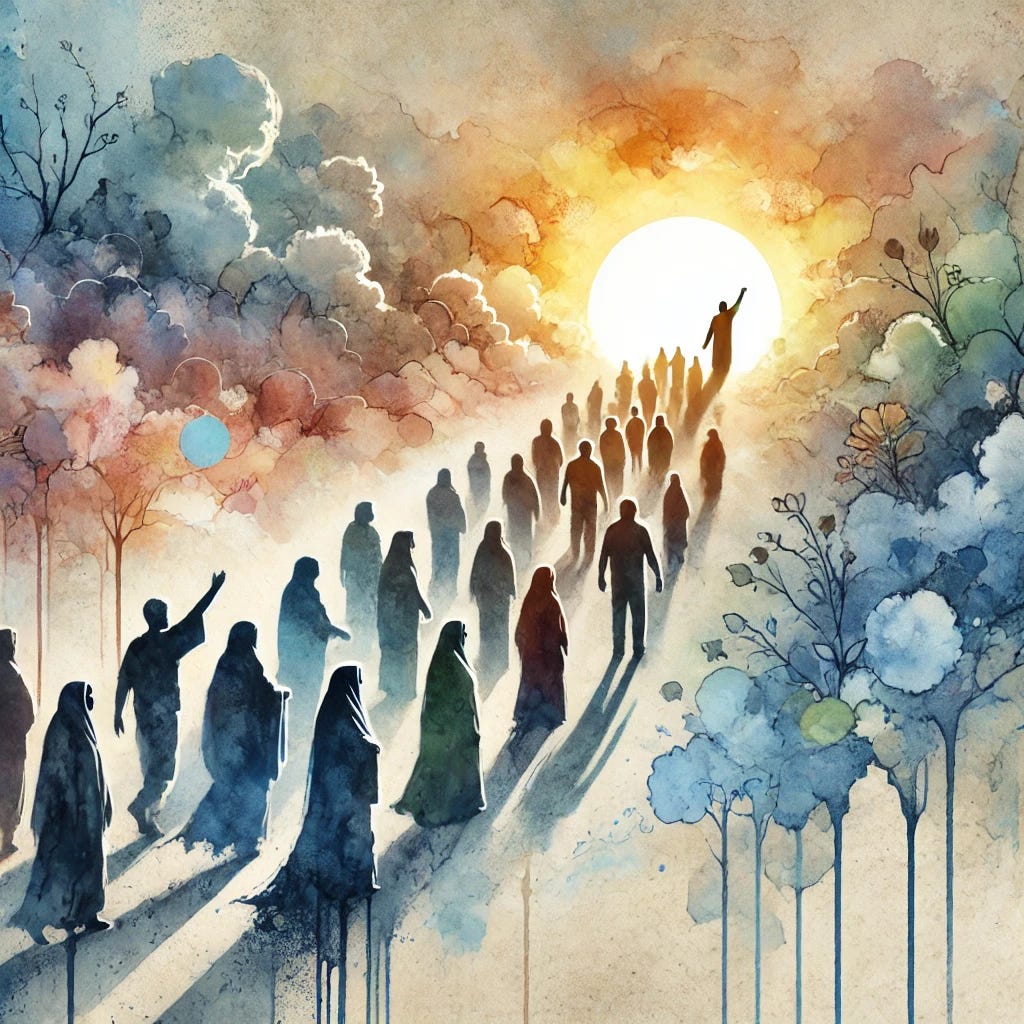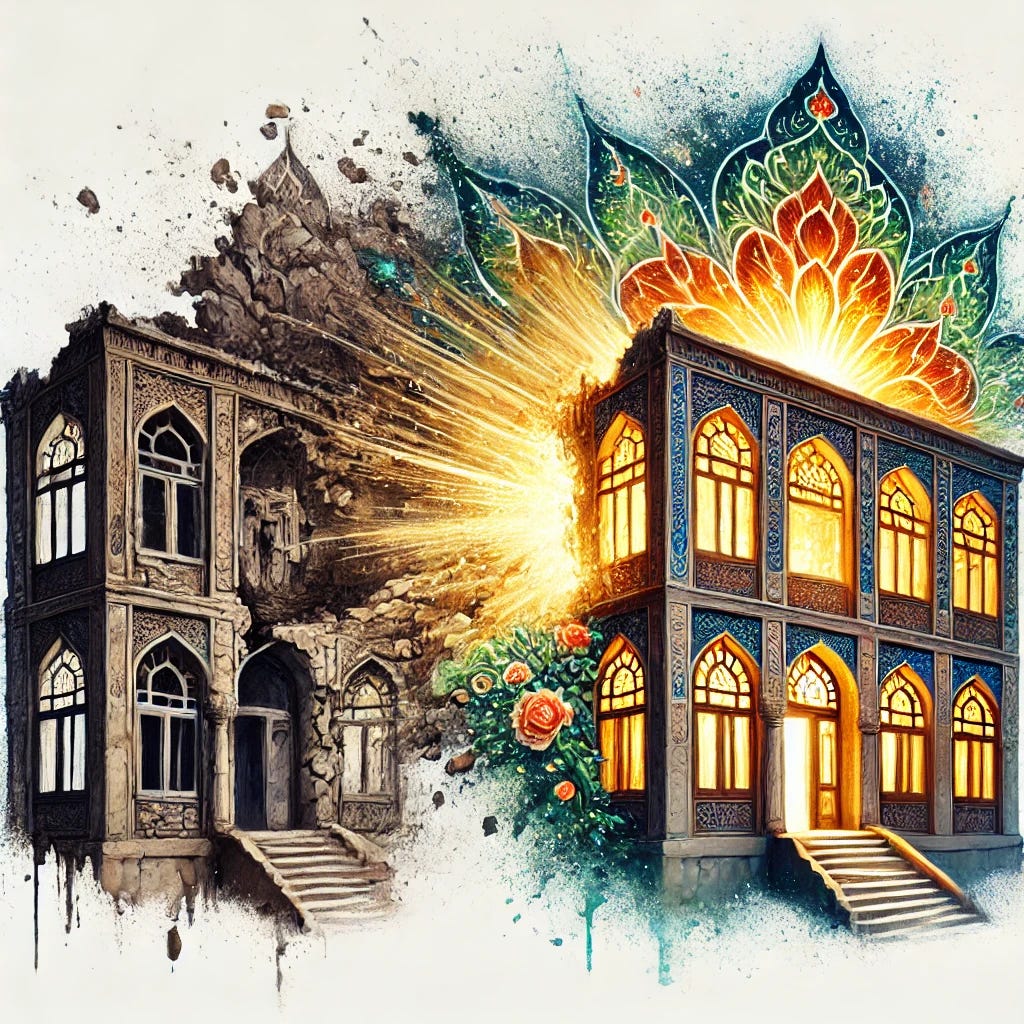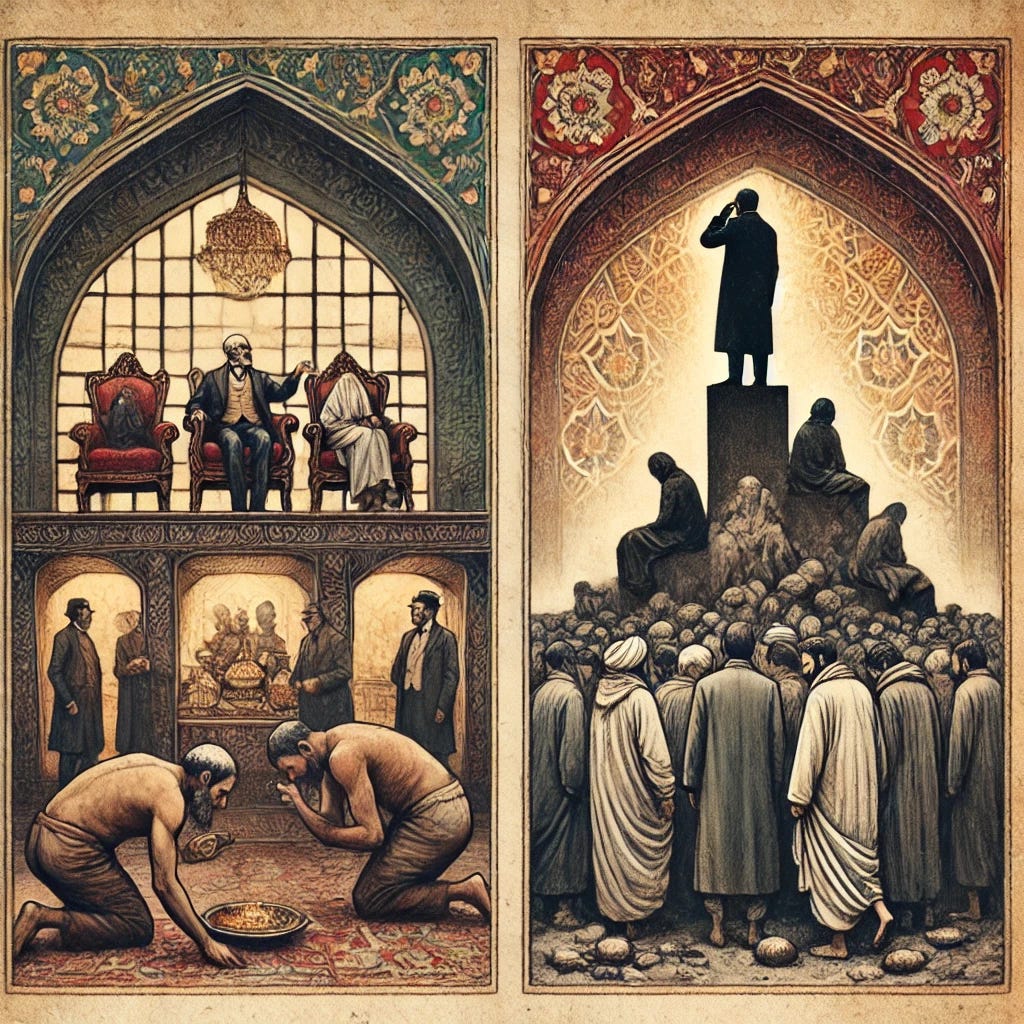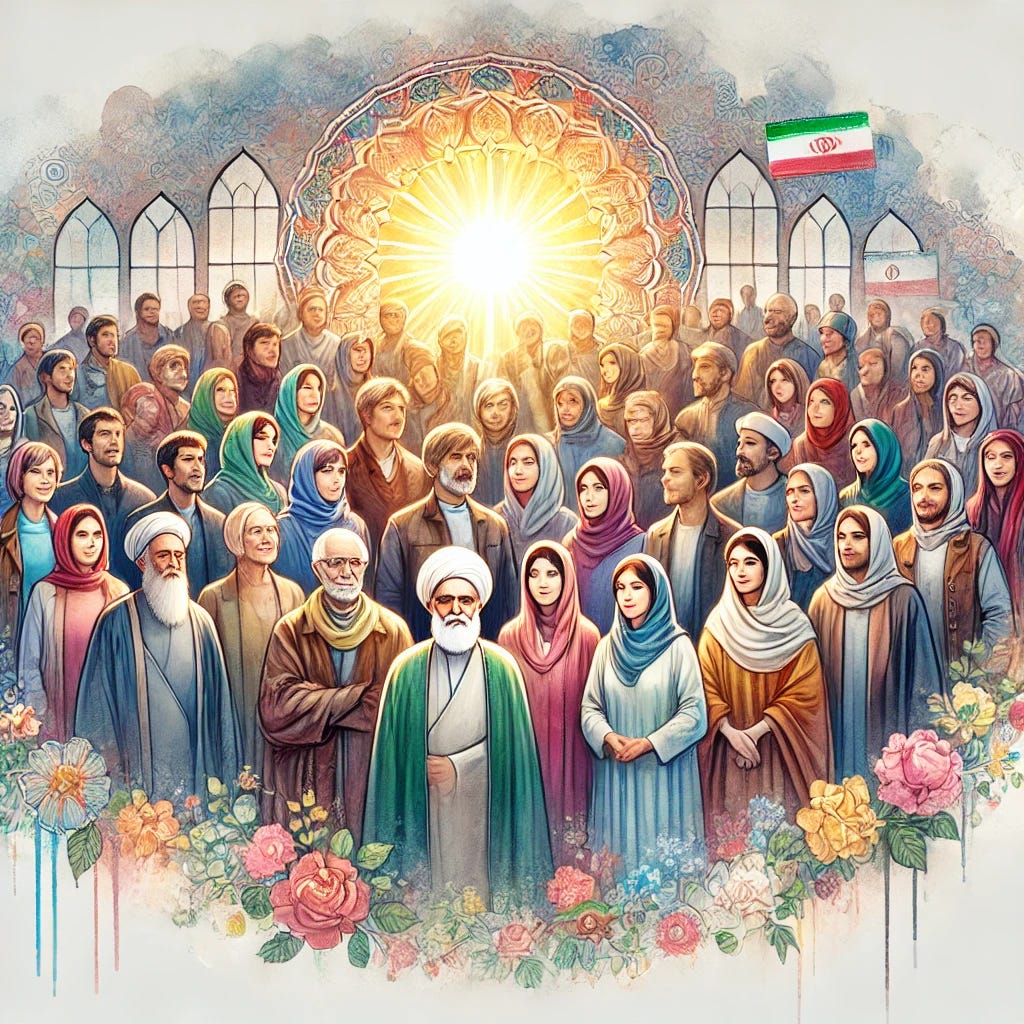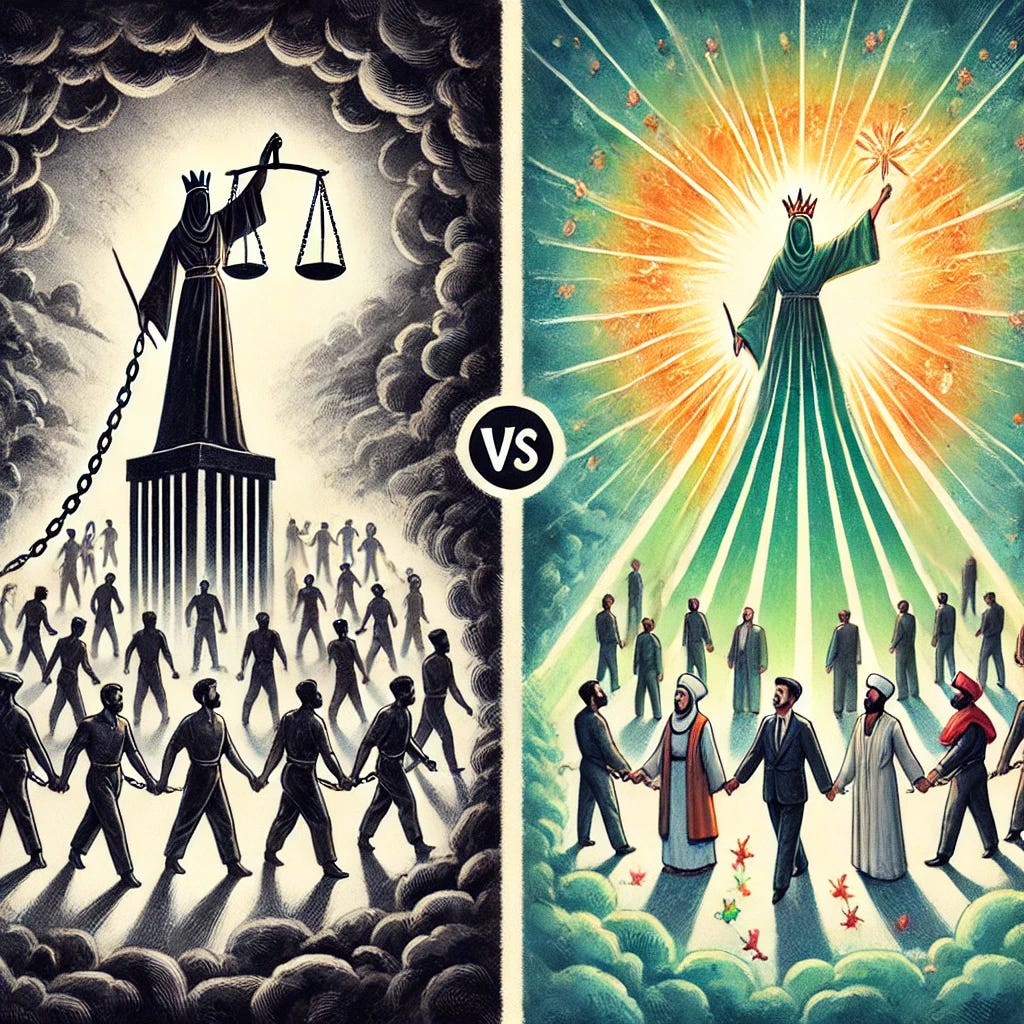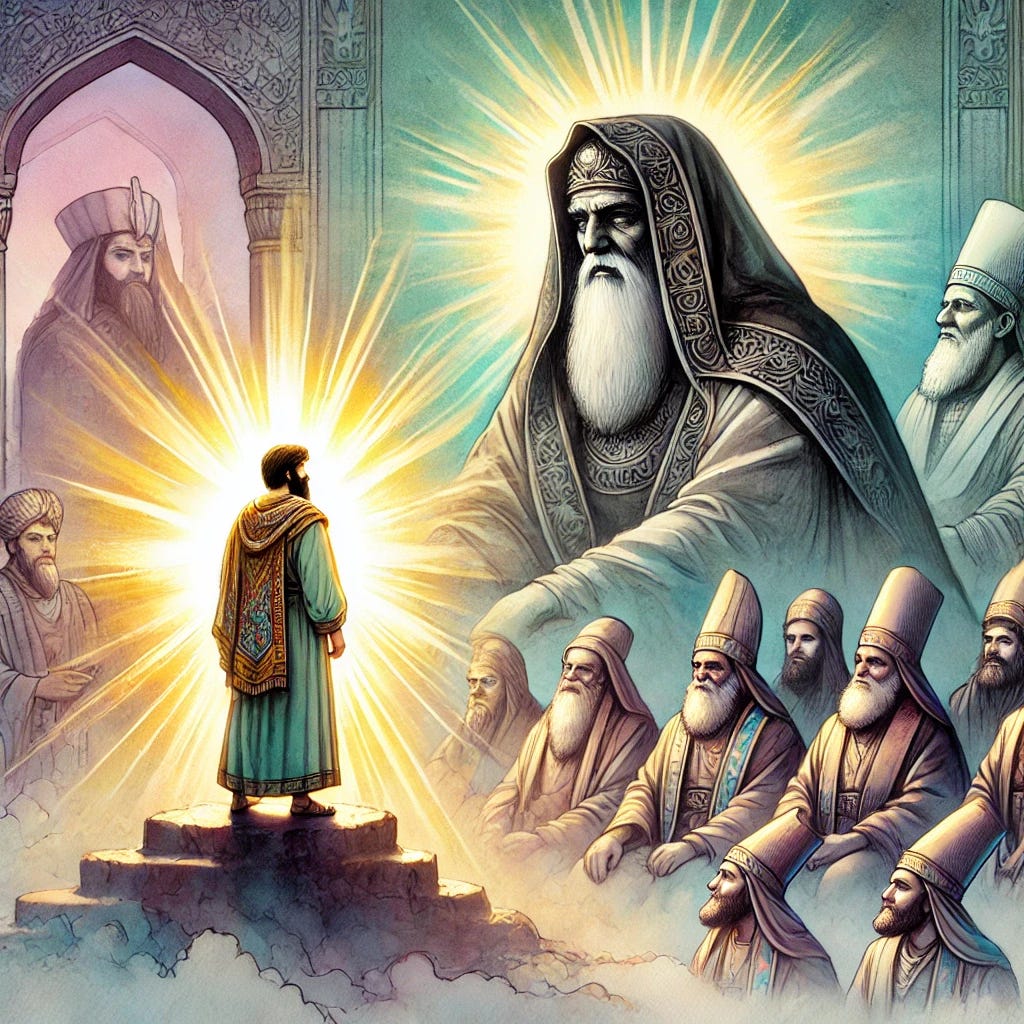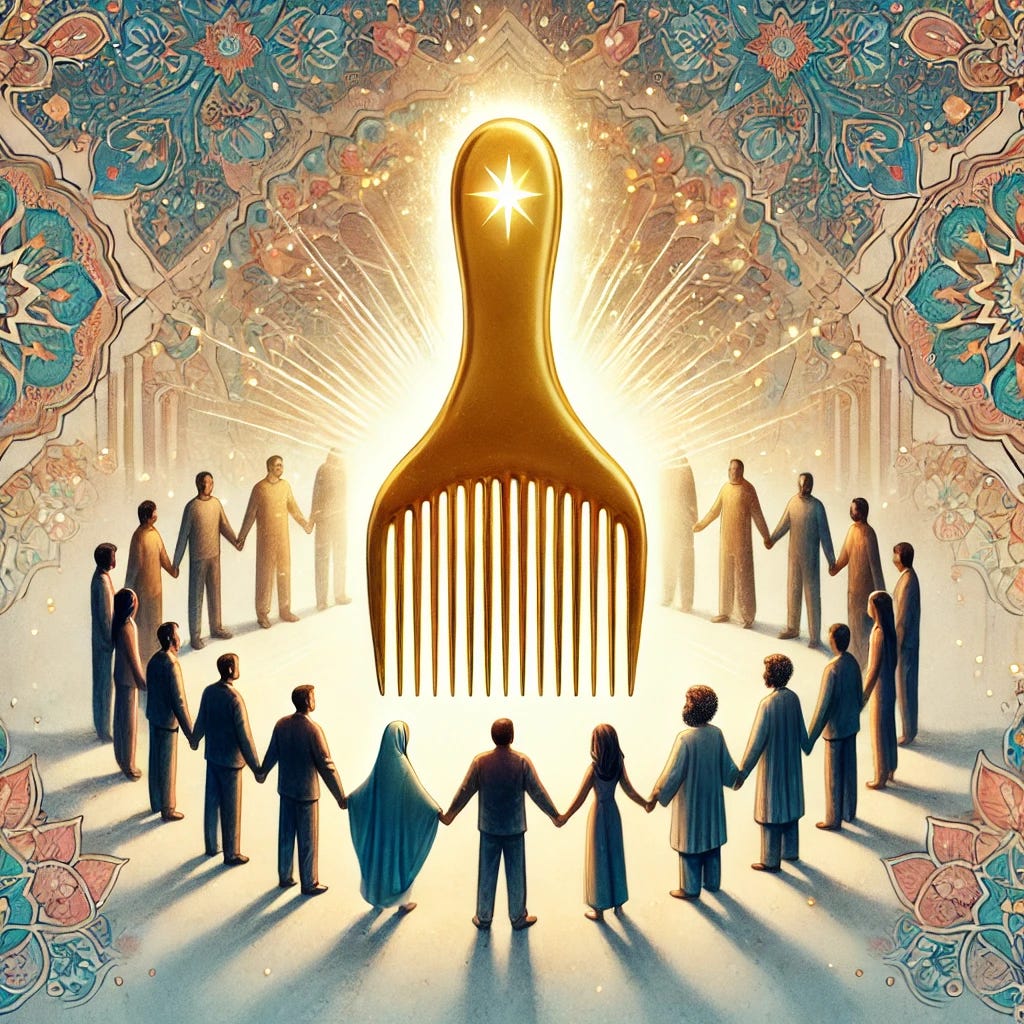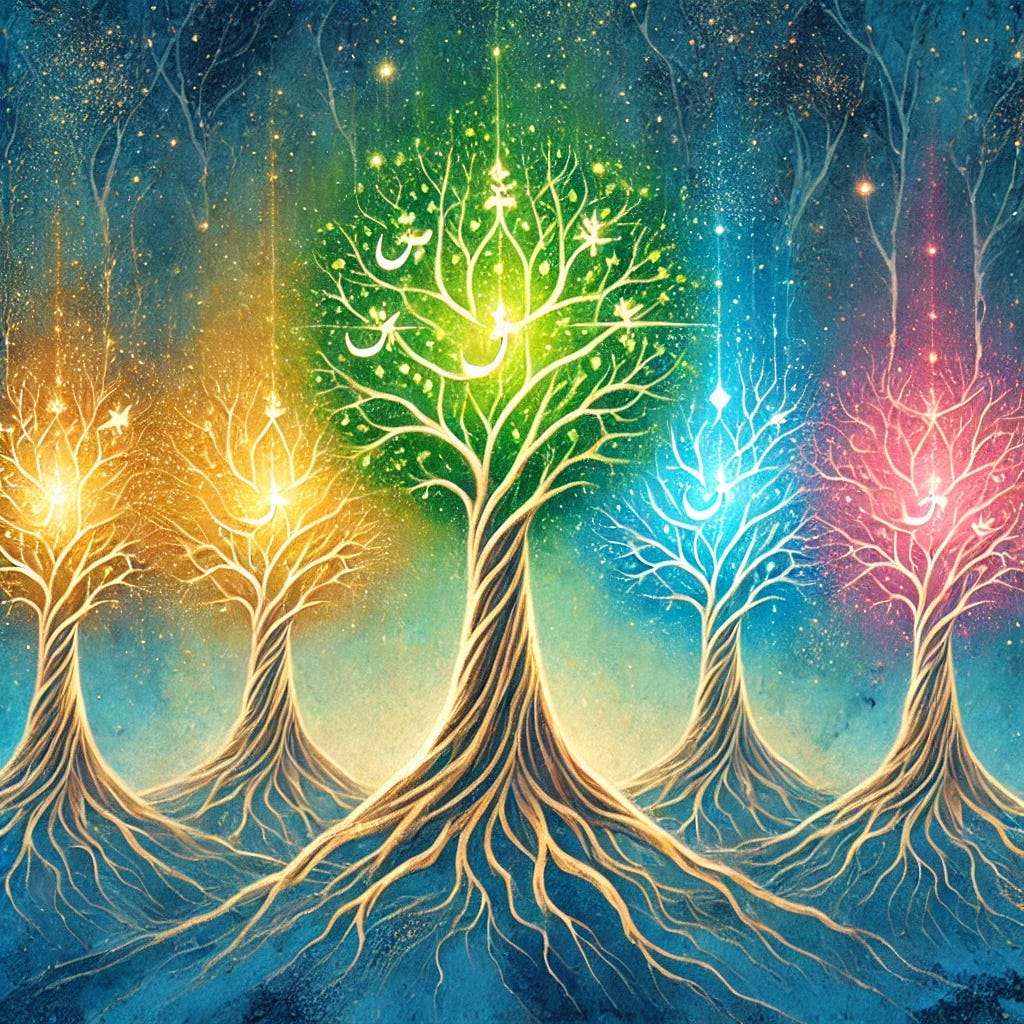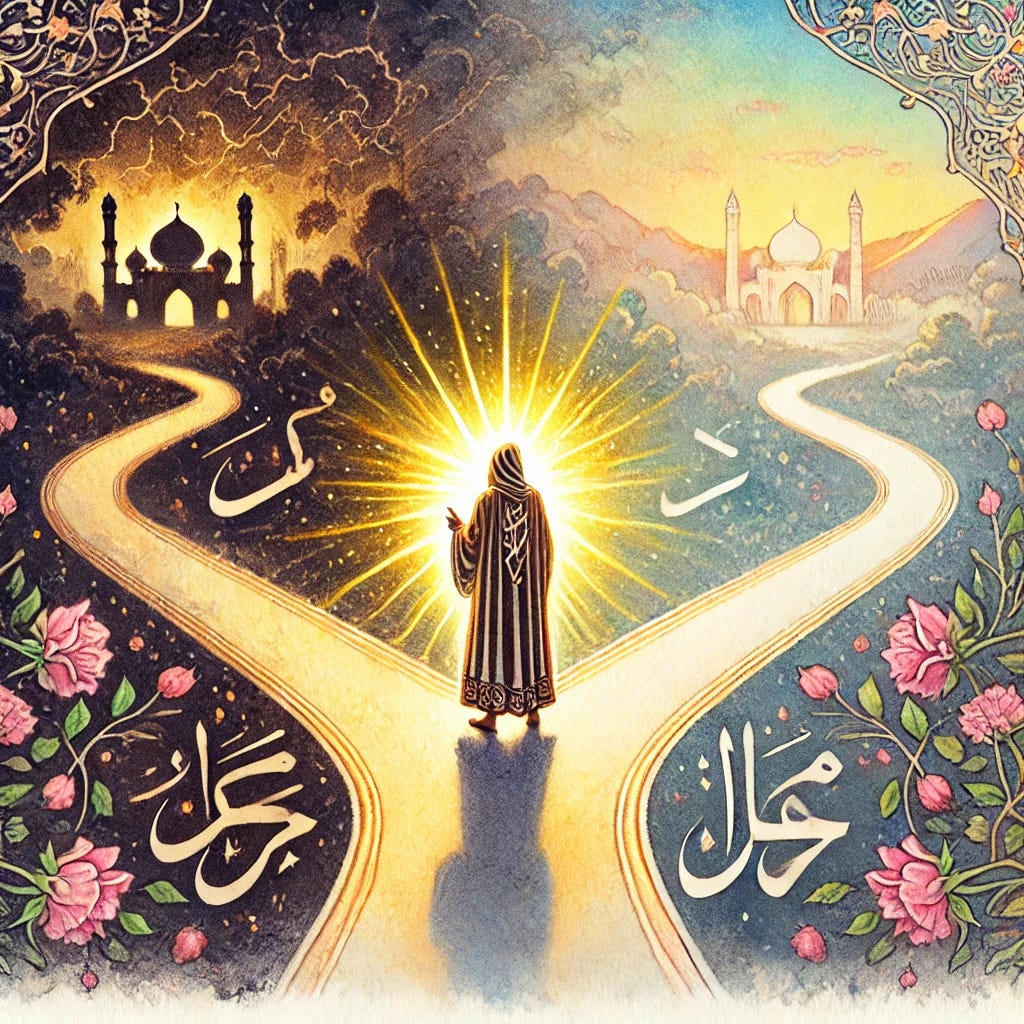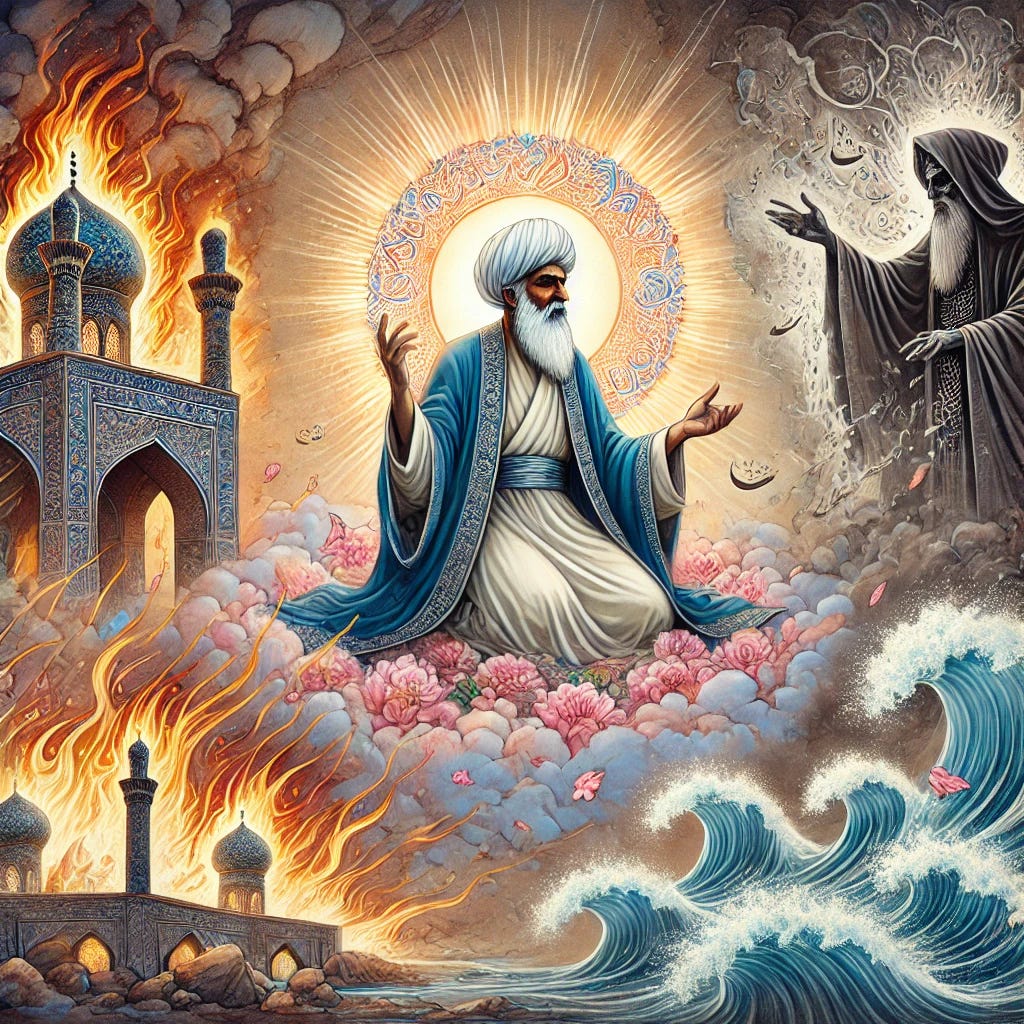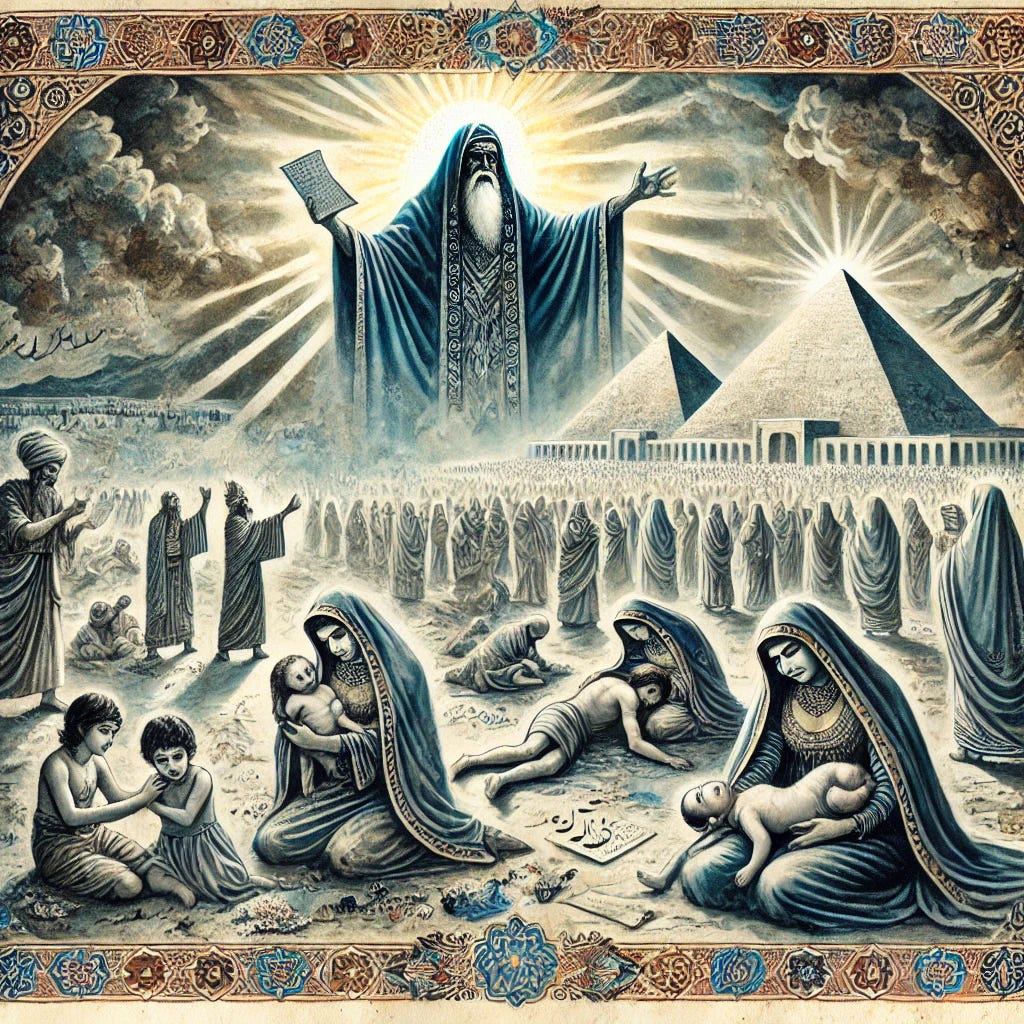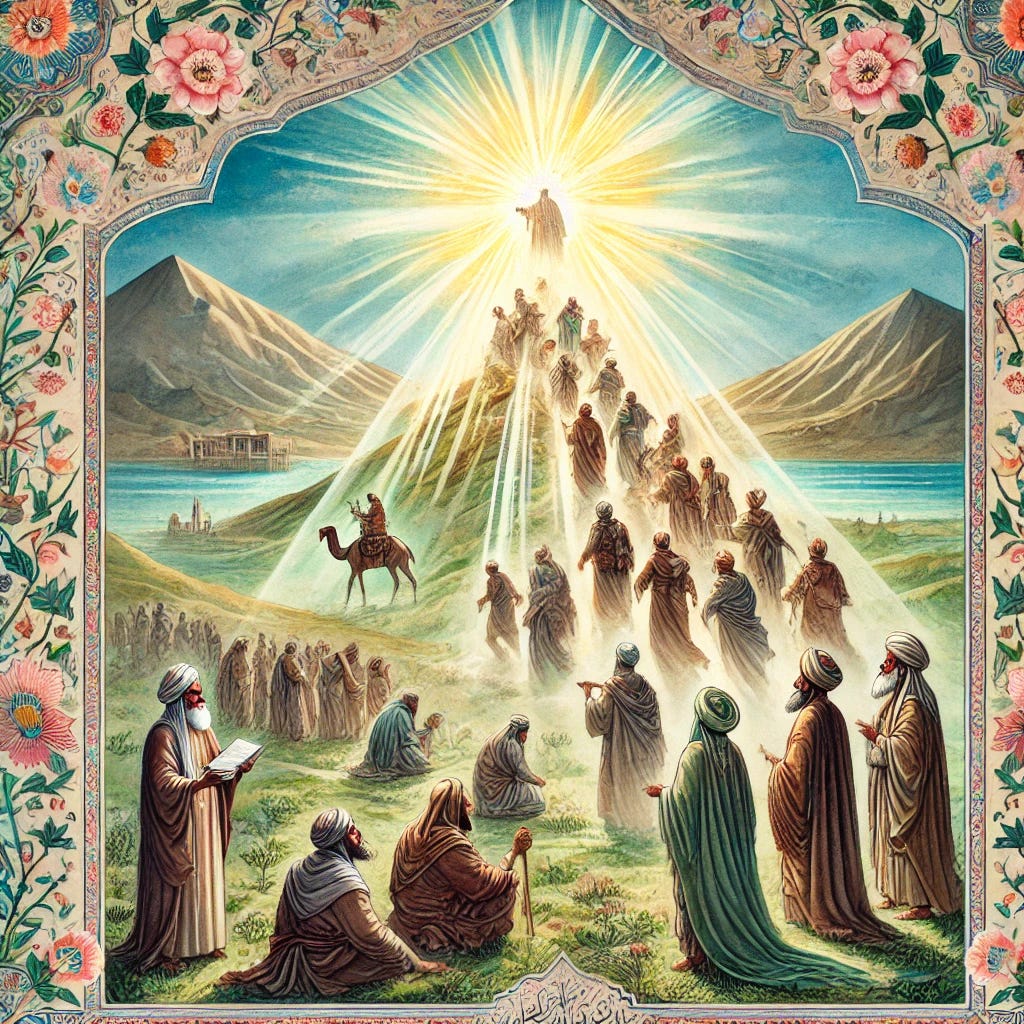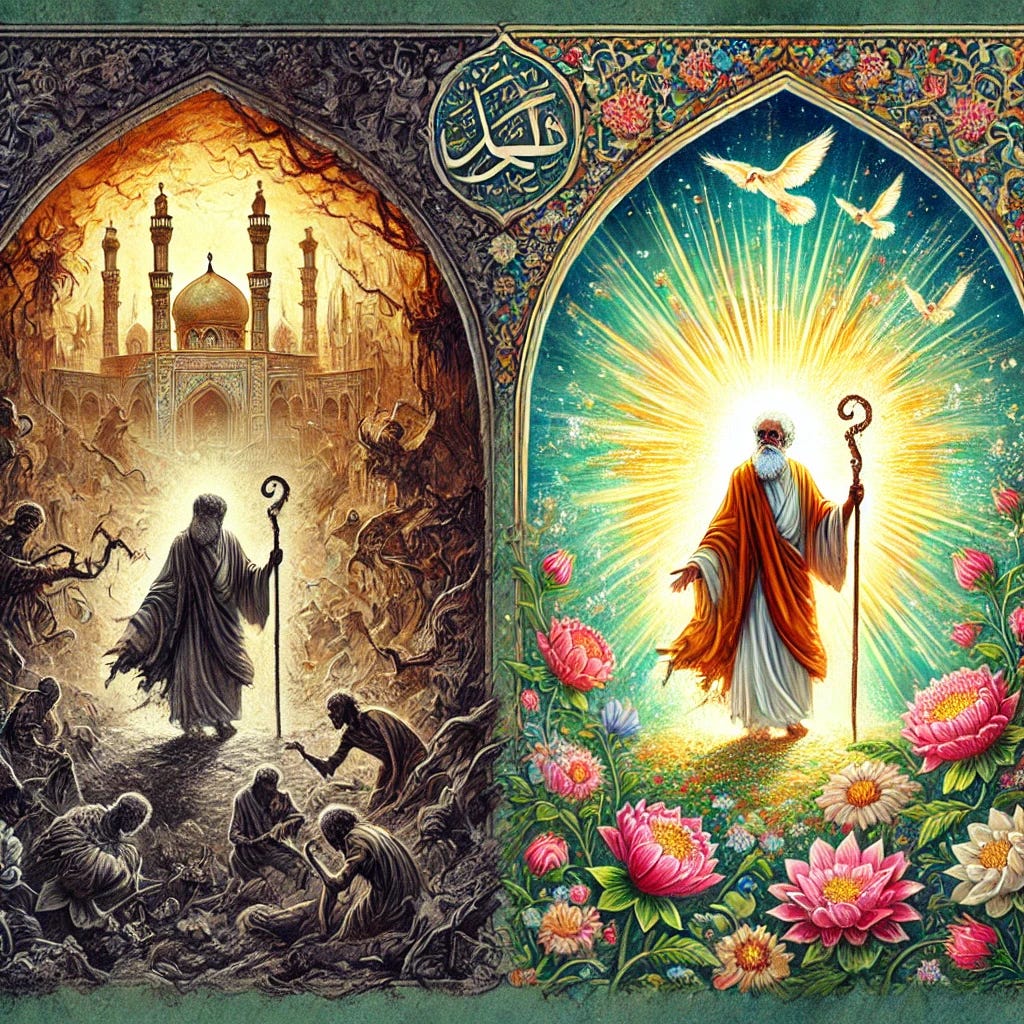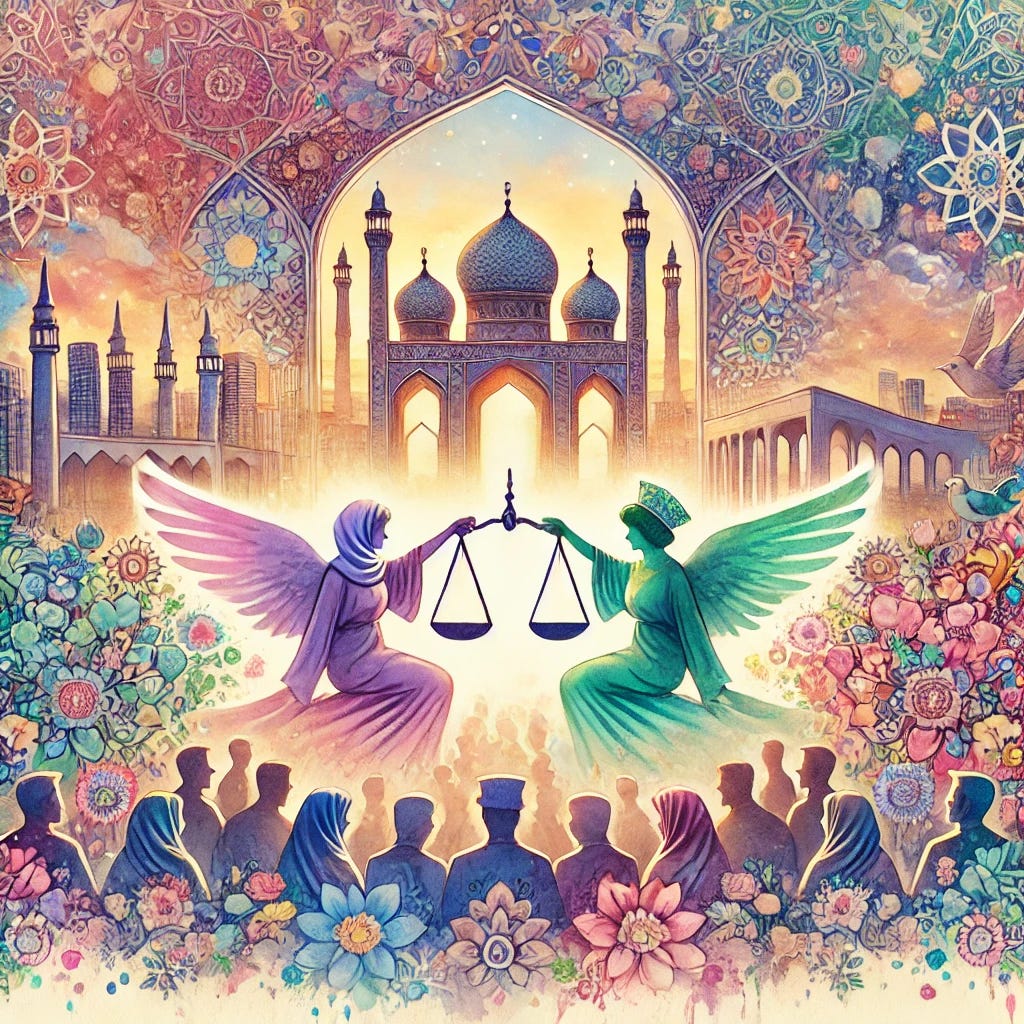[8] Prophethood - The Prophetic Resurrection of Society
A series of discussions on the teachings of Imam Sadiq (sixth Imam of the Muslims), from the book Misbah ash-Sharia (The Lantern of the Path)
In His Name, the Most High
This is part eight of an ongoing series of discussions on the book by Imam as-Sadiq titled ‘Misbah ash-Sharia’ (the Lantern of the Path).
It is strongly recommended that the previous parts are read, before proceeding with this one; to avoid any confusion or misunderstanding within the subject matter.
The nature of the subject matter, and the style of discourse requires that each part build upon those that came before it, so once more, I strongly recommend that the reader, read the previous parts, and then continue with this one.
The previous parts, can be found here:
Video of the Majlis (Sermon/Lecture)
This write up is a companion to the video majlis (sermon/lecture) found below:
Contents
Majlis - Misbah ash-Sharia - Servitude - Part 8
Nasheed: Abaya of Tears
Ziyaraah: Ziyarat Sayyedah Zaynab
Recap
In the previous sessions - we continued our journey of discovery regarding the subject of Prophethood. We had previously discussed the philosophy of prophethood, and in the last session we studied the mission of the prophets.
We learned about the powerful transformation that takes place within the heart of the prophet, as he is ‘raised up’ to perform his monumental task.
We looked at many verses from Quran that help us to understand these ideas.
This session, we will look at the manner in which the prophet resurrects the society.
As we had learned; when a prophet is appointed by God, he undergoes a transformation that prepares him, his heart and soul for the monumental task that he has to accomplish.
This transformation within the prophet, also lays the groundwork and starts the building of the foundations (that will be further built and strengthened by the prophet and future generations of believers) that lead to the ‘Prophetic Resurrection of Society’.
This is our topic for this session.
Of course it goes without saying, that reading the previous sessions prior to this one is critical - both in order to understand the subject - but also in order to understand the nuances that this discussion brings to the proverbial table.
So, if everyone is comfortable they have read the previous parts - then we can in the name of the One who supports the Prophetic Resurrection of Society, and is the Master of the Day of Resurrection, we begin, filled with hope that with His permission we can gaze into His beautiful face.
With His Most Beautiful Names, we begin:
Nubuwwah (Prophethood) - Part 3
Introduction
وَنُرِيدُ أَن نَّمُنَّ عَلَى الَّذِينَ اسْتُضْعِفُوا فِي الْأَرْضِ وَنَجْعَلَهُمْ أَئِمَّةً وَنَجْعَلَهُمُ الْوَارِثِينَ
وَنُمَكِّنَ لَهُمْ فِي الْأَرْضِ وَنُرِيَ فِرْعَوْنَ وَهَامَانَ وَجُنُودَهُمَا مِنْهُم مَّا كَانُوا يَحْذَرُونَBut we desire to show favour to those who were abased in the land, and to make them leaders and to make them heirs.
And to establish them in the land; and to show Pharaoh, Hamaan, and their hosts, from them that of which they were apprehensive.- Quran, Surah al-Qasas (the Chapter of the Narrations) #28, Verses 5 to 6
The Prophetic Resurrection of Society
A subject that arises out of the verses above; as well as the verses of Surah as-Saff (the Chapter of the Ranks) - below - is a topic that can be best described as the Prophetic Resurrection of Society.
يُرِيدُونَ لِيُطْفِئُوا نُورَ اللَّهِ بِأَفْوَاهِهِمْ وَاللَّهُ مُتِمُّ نُورِهِ وَلَوْ كَرِهَ الْكَافِرُونَ
هُوَ الَّذِي أَرْسَلَ رَسُولَهُ بِالْهُدَىٰ وَدِينِ الْحَقِّ لِيُظْهِرَهُ عَلَى الدِّينِ كُلِّهِ وَلَوْ كَرِهَ الْمُشْرِكُونَThey want to extinguish God’s Light with their mouths; but God will complete His Light, even though the disbelievers dislike it.
It is He who sent His Messenger with the guidance and the true religion, to make it prevail over all religions, even though the idolaters dislike it.- Quran, Surah as-Saff (the Chapter of the Ranks) #61, Verses 8 to 9
In the previous session, we learned that a prophet is a servant, chosen by God, who has been endowed with special potentialities, not granted to others, so that he can discharge the duty of receiving and then giving the message of God to the people.
He is entrusted with being the representative of God upon the earth.
Once this servant starts to receive revelation, he is changed, he is transformed at the very core of his being. Before he became a prophet, he lived a virtuous life but as an ordinary human being in his society, and he followed the course of his society.
However, once he was chosen, once he was ‘raised up’ to become a prophet, everything changed. When a person receives revelation, they are no longer the same person they were before they received revelation.
Some thinkers, who do not believe in the Prophet of Islam, including orientalists and the like, who do not necessarily have an agenda against Islam, have posited that before declaring that he was a messenger from God, the Prophet must have spent his days studying and contemplating and that this is what brought about the transformation of his character.
However, this theory does not match the apparent situation of the Prophet and is, entirely inaccurate and false.
It was not through meditation and reflection that the Prophet was transformed and began preaching the message of Islam. On the contrary when he was raised up as a prophet and charged with his mission, this represented a complete break with his past self.
This is not only true of the Prophet Muhammad, but of all the prophets of God throughout history.
Moses (Musa), for example, was on a regular journey with his wife and child, when on a dark night and in the middle of the wilderness, he had an encounter with God that changed him, and he began to receive revelation.
He forgot everything else. When Moses received his divine mission, he became a different Moses to the Moses he had been mere moments before. Something had changed inside of him. His soul was in motion in a way it had never been before.
Someone who claims that prophethood has nothing to do with God or the unseen world is simply repeating the claims of orientalists, who base their theories on limited research and information.
In any case, the ‘raising up’ of a prophet refers to a transformation, a change, an alternation, or to put it another way, a resurrection in the being of the person who has been chosen by God to serve as his messenger.
When this transformation has taken place, the role of the prophet begins, that is to take this inner transformation and realise it in his external reality. To mirror the change within the prophet’s spirit to the fabric of society.
This is what is meant by the ‘Prophetic Resurrection of Society’.
What is Revolution (Inqilab)
These days when we use the term ‘transformation’, this has taken on a new meaning in the modern lexicon, that of ‘revolution’. This is a very interesting and meaningful term.
However, it should be clear, that what we are talking about is a major change at the very foundations of society. This does not necessarily refer to a contentious, violent or even bloody event. It is possible, that this change can occur peacefully and through dialogue, or through struggle and conflict - especially if there are powerful forces resisting this change.
It is also possible, for there to be violent events that lead to a ‘revolution’, however, since the Arabic word ‘inqilab’ (revolution), does not contain such a definition, it can also, therefore, happen peacefully.
If we want to give a simple analogy for the meaning of the word ‘inqilab’ (revolution), consider a building wherein people reside.
It has a particular structure and architecture.
The walls, doors and foundations all have a specific layout and placement. Now, imagine if we want to change this building - say it was a mosque or church, and we want to convert it into apartments for people to live in; we would need to completely change the architecture.
We would need to tear down some walls, put some new walls up, we may need to block off certain doors and passages, and open up new ones. We may even have to modify the foundations in order to support the new structure that we wish to put up.
Now, imagine, if we want to, instead of an apartment building, we decide to build a high security bank, or a banquet hall, or a house for a single family - then what?
We would have to make completely different changes to the architecture of the building in order that we can accommodate the function of the new building.
It would not be possible to simply give the building a new coat of paint, and declare that it is something else entirely.
This is because each of these buildings we want to erect has its own particular layout and design according to it’s function and the purpose it is supposed to serve.
For example, a masjed (or mosque) is designed to serve as a place for Muslims to gather and worship, a church is designed to serve as a place for Christians to gather and worship - and the configuration of a mosque is very different to that of a church in many aspects.
A bank has an entirely different purpose.
Therefore, if we ever wanted to make changes to a masjed in order to change it to something else, to another kind of building, we would have to make some core, fundamental changes.
This is the meaning of ‘inqilab’ or revolution.
It means changing the building, starting from the foundations; completely changing its structure, its design, the placement of any load bearing walls, the materials it is made from, and so on and so forth, such that it becomes a completely different building to what it was before.
Revolution (Inqilab) In Society
Let us now imagine a society, for example, one of fifty people, fifty-thousand people, or five hundred thousand people, or fifty million people. It doesn’t matter how many.
A society is a collection of people, who live together and co-operate with each other according to a general programme or plan; all walking similar paths. Of course, there are different parts of a society, but they are generally all moving towards the same general direction.
They are a unit, so to speak. A single society. This society, which may contain anything from five to fifty million souls, could fall into one of two general categories of society.
There are two ways in which a society can be organised.
Class-based Society
One of these is that, of these fifty or fifty million souls living together in a single geographic region, there is a class of people - a minority - who govern, who give orders, and who hold authority over the rest of society.
They are the ones who direct the activity of the society as a whole. They are the ones who legislate the laws that govern people within that society. If people act against their wishes, they punish them, severely. If they criticise their rule, they will silence them using various means.
If the society suffers a catastrophe of some kind, they - the ruling minority - will use this catastrophe to their advantage, even if this is to the detriment of the other members of the society.
If a tribulation befalls the society, it is the ordinary people that will be left to suffer, while the elite will use their positions to protect themselves. This is one kind of foundation for a society - whether or not this society contains any class differences or not.
If we imagine a society in which there are class differences, this means a society in which people are not seen as equal before the law, nor do they have equal access to benefits and facilities of that society, nor is there a roughly equal standard of living.
There will be one group that enjoys more privileges and benefits and better lives as a result, and who have the right to compel others, to order others to do their bidding, and another group who are compelled to serve this elite group, to obey their orders and to submit themselves to them.
If such a society exists, this is what we call a ‘class-based society’. Even the constitution would be class-based.
This is one kind of society.
God-based Society
Let us now, imagine another kind of society, for those fifty or fifty million souls. If it is not to be like the ‘class-based society’, that we have just discussed, then what is it to be like?
This would mean that no individual in this society has the right to make demands of any other individual. Not only is there no class of individuals above all others, but there is also no individual higher than any other.
You would not find a single person in such a society, who, if asked ‘Why did you commit such and such act?’, would answer: ‘Because I wanted to’.
There is no ‘because I wanted to’ in this society.
No one has any right to rule over anyone else, to dominate anyone else, or to deprive anyone else of their rights. Everyone is equal before the law. No one is any lower, worth any less, or any less deserving of justice than anyone else. All of the fifty or fifty million (or any other number) people follow the same laws and rules, and submit to a higher power.
And who is this power? It is God.
A Discussion on the Configuration of Society
So, there are two basic ways in which we can design the structure of a society. In one such configuration, the majority of the people are effectively the slaves or prisoners of others.
Whereas, in the other configuration, no one needs to submit to anyone else, nor be held prisoner by anyone else, because everyone is a servant of God.
With the first type of society that we examined - the class-based society - we saw that the economy, for example, would work primarily for the benefit of the ruling class, its government would fulfil the wishes of it’s ruling class, its constitution and laws would be drafted to safeguard the interests of its ruling class - or of those allied to them.
Conversely, in the second type of society we mentioned - the God-based society - a society that is not driven by class divisions, in which no-one has the right to boss anyone around, or to dominate anyone else. The economy, as an example, is run for the benefit of everyone. The constitution and legislature are for everyone.
Most importantly, whatever is good, is good for everyone, and whatever is bad, is bad for everyone. In such a society, everyone has a share.
This is a paradise on earth.
These two configurations of society can be observed throughout history. We will not go into too much detail, as this is an exceedingly complex and detailed discussion, which touches on many religious and social issues, and this is not the correct place for such detail - at least at this time.
More so, it would take us many hours, days or weeks even to deal with this topic in even a partially exhaustive manner; therefore what we will discuss going forward can be, and should be seen as a basic summary discussion, and everyone is free to do their own further research on this subject should they so desire.
Perhaps in future sessions, we will also be able to discuss these highly complex and detailed subjects in much more detail, God willing.
So, as we have two configurations of society. One being the class-based society in which there is wrongdoing, oppression, inequality, exploitation, division and domination.
The other being the God-based society, which is classless. Within this there is justice, humanity and freedom. Indeed, special emphasis should be placed on ‘freedom’, because there are societies which profess to be ‘classless’ in which nobody is the servant or slave of anyone else; in which all are equal and all benefit equally, but which are actually lacking in freedom.
You can see that both kinds of societal configurations have existed through the course of human history, and indeed, exist in our present day.
Class-based societies are those in which discrimination prevails. They are the societies founded by emperors and despots.
Whereas God-based societies are those in which freedom and humanity prevails, where there is no division or discrimination. These are societies that were founded by the greatest of God’s prophets.
Societies Founded by God’s Prophets
Now, a question might have come to the mind of the reader, “Did the prophets found societies?”, to which we must answer, “Yes, certainly the prophets founded societies.”.
In the Quran, we find numerous examples of the kinds of societies that the prophets founded.
Examine the tales of the likes of Solomon, Saul (Talut), Moses (Musa). Look at Moses and his leading of the Israelites to the holy land after freeing them from their enslavement in Egypt.
After he - Moses - led them out of Egypt, where did he take them?
He wanted to take them somewhere where he could create a just and virtuous society.
We will touch on these subjects in more detail in the next session, God willing, but for now this should suffice.
In brief, there are two kinds of society. Both kinds have existed throughout history. The intellect clearly recognises which of these is bad and sees that this has been manufactured in the ungodly political regimes of the world throughout history.
The intellect also recognises which of these are good, and sees that they have always been instantiated in the virtuous political orders of world history - meaning the prophets of God.
The prophets were sent to their individual societies in order to transform societies from the first kind - class-based - to the second kind - God-based - societies.
This is the very essence, the core of our topic for this session.
What is a Prophet?
Many people think that the prophets came to a society like a wise and generous philosopher - a mountain of knowledge and wisdom - who came to society, rented a home, sat in a corner so that people would come to him and hear what he had to say!
They think that a prophet is this sort of person.
Now, imagine, that a prophet is sent to a particular society, as - for example - Abraham (Ibrahim) and Moses (Musa) were, and takes up residence in a house, where he sets aside an hour of the day for meeting with believers and non-believers alike.
Whoever comes to visit him, he enjoins them to good, and forbids them from evil. He tells them to fear God and proves that He exists. He discusses. He makes some of them better people. Then he leaves this world behind. This is how some people imagine a prophet to be.
But this is NOT how a prophet is!
When a prophet is sent to a society, this means he is chosen and - as we have discussed previously - he is transformed through a resurrection of his spirit. He is a radically different person, a leader of a movement, who never stops, who never rests. His mind and soul are aflame.
He takes one look at society and sees that the whole edifice needs tearing down and rebuilding. The whole social structure is wrong, because it’s architecture goes against the very essence of human nature. He sees that it must change. He sees that the structure must be transformed.
What does this mean?
It means that he sees that this society is class-based, that it is rife with division, injustice, wrongdoing and inhumanity. Therefore, it must be rebuilt, and reordered into a society that is oriented towards God, towards Tawheed (Monotheism, the Uniqueness/Unity of God).
A Tawheed-Oriented Society
What is a ‘tawheed-oriented society’? If we examine the idea of tawheed (monotheism, unity/uniqueness of God) as we have discussed previously.
We can also say that true tawheed by its very nature means the abolition of all social classes.
True tawheed means the power and governance of God.
True tawheed means that everything, where the law, traditions, treaties, manners, culture - everything - must be inspired by God.
True tawheed means that everyone is a servant of God alone. they do not serve anyone or anything else.
Being servants of God, makes them free from serving all others. When a prophet enters society with this ideal, with this thought, and indeed with this goal, this class-based society will be transformed.
It will be brought down and utterly ruined, and a classless tawheed-oriented society that is entirely free from tyranny and under the rule of the Creator will replace it.
This is why prophets are sent.
Prophets come to Transform Societies
If we consider, when Moses (Musa) came to Pharaoh, and told him that he should not sit upon the throne, that he should not enslave the Children of Israel, and that he should not divide society into different classes. Had Pharaoh responded:
“You’re right, we do need to change things. Tell me what we need to do!”
Then Moses would have set about changing society like a great architect, without a single drop of blood being shed. It is from those in power that violence plays a role in the prophetic transformation of society.
The Quran, in Surah Aal-i-Imraan - the Chapter of the Family of Imraan, the third chapter of the Quran, verse 146 says:
وَكَأَيِّن مِّن نَّبِيٍّ قَاتَلَ مَعَهُ رِبِّيُّونَ كَثِيرٌ فَمَا وَهَنُوا لِمَا أَصَابَهُمْ فِي سَبِيلِ اللَّهِ وَمَا ضَعُفُوا وَمَا اسْتَكَانُوا ۗ وَاللَّهُ يُحِبُّ الصَّابِرِينَ
How many a prophet fought alongside him numerous godly people? They did not waver for what afflicted them in the cause of God, nor did they weaken, nor did they give in. God loves those who endure.
- Quran, Surah Aal-i-Imraan (the Chapter of the Family of Imraan) #3, Verse 146
This is why the doctrine, of holy resistance or holy struggle was promulgated.
Because the ruling class, the ones against whom the revolution is directed and those who stand to lose the most in the event of its success, are not ready to let it happen.
Otherwise, had they truly understood, had they - like so many other men of wealth and power throughout history - suddenly experienced a change of heart and submitted to the truth, and come down from their high places, then there would have been no need to fight whatsoever.
Therefore, when a prophet enters a society, it is for the sake of bringing about this transformation. The prophet comes to make a change.
What does change look like? What does he do?
If we look at pre-Islamic Arabia, the Prophet Muhammad, peace and blessings be upon him and his pure family and righteous companions, came and asked why all the wealth of this society should be concentrated in the hands of a select few.
Why should servants and slaves be subject to the whims and desires of the elite?
Why should the weak be at the mercy of the wicked?
Why should there not be equality between people?
People Are Equal, Like the Teeth of a Comb
There is a saying, “People are equal, like the teeth of a comb’. If you look at a comb, do you see how each of its teeth are level with the next? How there is not one single tooth that stands above the rest? All are equal. All are at the same level. All are one size. All are one form. They are all the same - and beautiful.
Humanity is like this.
“People are equal like the teeth of a comb”
- Kanz al-Ummal (The Treasure of the Doers of Good), al-Hindi, Hadeeth 24822
This is the call of our Prophet:
“All of you are from Adam, and Adam is from dust!”
- Sunan Abi Dawud, Book 43, Hadith 344
- Jami’ at-Tirmidhi, Vol. 5, Book 44, Hadith 3956
That man of influence, who sits in his mansion on a certain section of Makkah, who must eat and drink well, for whom the people do business, who owns slaves and workers and makes use of them, and who rules over the city, this man of influence with this description is no different to the lowliest servant in his house.
There is no difference between them.
In terms of the basic substance of humanity, they are entirely alike and without any distinction between them. So why should one enjoy such wide power and influence, while the other barely has enough to eat?
The field should be open for everyone to participate in society.
This is the call of the prophets.
In all of the societies where a prophet appears, it is with this call and this mission.
A prophet comes to reform society, to change it from its existing form, which is wedded to inequality, wrongdoing and tyranny, into a new form that is balanced, beautiful and just.
This is what the ‘Prophetic Resurrection of Society’ means.
Every prophet sent to a society came to achieve exactly this. There was never a single prophet who came to just sit in the corner and discuss the whims of everyday life with people.
The Prophets of Firm Resolve
The greatest of the prophets - known as the Ulu al-Azm or ‘those endowed with great and firm resolve’.
These prophets were the ones that came with new messages; whereas other prophets followed their message and continued on their path.
The Prophets of Firm Resolve are five:
Noah (Nuh)
Abraham (Ibrahim)
Moses (Musa)
Jesus (Isa)
Muhammad, peace and blessings be upon him and his family
Each of these Prophets brought a new - or rather updated message from the Lord of the Universes - they were ‘raised up’ in their societies and started powerful movements - the impacts of which can be seen to this day.
These ‘Prophets of Firm Resolve’ are the ones who were the axes of divine transformations in society, and all other prophets came to follow the path shown by these great messengers, or to continue or complete the works they began or to bring their plans to fruition.
Just as the successors of the Prophet of Islam, Prophet Muhammad, peace and blessings be upon him, his pure family and righteous companions, after he passed away, took up his work after him - such as the role of the First Imam of the Muslims, Imam Ali, the work of Imam Hasan, the second Imam of the Muslims, the work of Imam Husayn, the third Imam of the Muslims, and indeed all of the Imams.
After the Imams it became the duty and work of the scholars of Islam.
Ultimately today, it has become the work of the Master of the Age, may our souls be his ransom, and may God hasten his return.
Having said that, given that Imam Mahdi, the Master of the Age, may our souls be his ransom, is still - on account of our lack of readiness - still behind the curtain of ghaybah (occultation). In his absence, during his occultation, the work and duty does also falls to the righteous scholars of Islam - those who we have referenced as the Righteous Islamic Leadership.
Why is the Resurrection of Society Necessary?
An important point about this resurrection of society is that of it’s necessity. Why is it necessary in the first place?
You might ask, what was the problem with pre-Islamic Arab Society? Why couldn’t it remain in place? Could it not be made into a fairer social order?
This prophet who came had to put himself through fire and water and make personal sacrifices in order to change his society for the better? Why did he have to do this?
Why couldn’t they have left things as they were? What was wrong with the natural order of things? Might, after all, we are told, makes right - so let the victors enjoy their spoils?
Those who are downtrodden are downtrodden because they were beaten. So why should the Prophet work so hard to change this?
This is an important question.
Some might say that ‘no-one asks this question’, but even if they do not ask it out loud, they might still ask it of themselves. So it is a question that must be address and answered.
A prophet does not move without a destination in mind. He did not go through the fire and water without a valid reason. On the contrary, he looks at the social reality of his own day and age and sees that it is one wherein falsehood dominates, and one which goes against the nature of the human being and the nature of the universe, so he wants to replace falsehood with truth, and redirect society towards the path of truth, to a path that is in sync with human nature and the nature of the universe.
Truth and Falsehood
Truth and falsehood - these are two words you find mentioned throughout the Quran.
The confrontation between truth and falsehood is embodied in tens of it’s verses. But what are truth and falsehood?
Let us try to understand what these terms means.
What is Truth (Haqq)
The human being is a creature that travels through the world with such and such a shape and appearance. However, the human being has certain features, abilities and needs which are unique to himself. This world in which the human being lives out his days also has certain features and characteristics, and it is moving towards the end for which it was created.
The world that we behold with our two-eyes - all of it is related. It’s sun, a million miles away. It’s humans. It’s plants. It’s animals.
Even though none of these appear to be connected at first glance, from the perspective of someone who knows God and worships Him, there is an indivisible unity at the core of all things.
The whole cosmos is one thing. All of it’s parts are parts of a single body. And like a single body, it is moving with all of it’s parts in unison. This is the nature of the world we inhabit.
In the human being, we see that the stomach performs one function, the eye performs one function, the liver performs one function, the brain and nerves perform one function, but when you put it all together you find that they have one thing in common.
They all contribute to the life of this human being, to his movements, to his efforts, to his continued existence in this world.
The sum of all the motion you witness in the cosmos, where or a grand or microscopic scale, when put together, it is clear to see that the entire universe is moving as a single unit, that it is moving as one.
All of the other denizens of this cosmos who exist alongside the human being, which either lack awareness or free-will, have no say in the direction that they travel. They go with the flow of the universe.
It is only the human being that has free will. It is only the human being that can choose to do his own thing, to separate himself from the cosmic sequence of events, to turn around, to walk the other way. It is only the human being that can choose not to follow the cosmic procession.
Everything else that exists, if it can be taken out of its natural state or diverted from it’s natural heading, it is only by virtue of human interference with it.
It is the human being that discovers uranium and, instead of using it to treat thousands of illnesses, turns it into a bomb with the capacity to kill millions.
Uranium does not make itself into a bomb, it merely follows it’s natural course. It is not the Marijuana that, instead of being a medicine to cure sickness, is instead made into a drug to intoxicate youngsters. It is not the fault of Marijuana how it is to be used. It is not the fault of the matter. Rather, it is the fault of the human beings that choose to use it in this way.
In this procession, of which the sun is one member, the earth is another member, the cosmos and all of its countless denizens are members, all of these are following their natural path.
There is only one kind of being - this devil, this agent, this free-willed entity - that sometimes diverts these things from their proper paths.
Uranium follows its natural trajectory. Marijuana follows its natural trajectory. Morphine follows its natural trajectory.
Morphine, which should be used entirely for the purpose of helping humanity, can instead be used to immiserate humanity.
A foodstuff which should give life to mankind is instead used to bring death to mankind. It is not by it’s own choice that it does this. It is the human being that diverts it from its proper course. It is only the human being that has this ability.
Because the human being has this ability, and because the human being has free will, the human being has the power to change, and because he has the power to change, there must be a law to guide him and direct him to the right path, to tell him how to join the cosmic procession towards God.
Also, a law to warn him that if he leaves this path, he will have left the cosmic procession.
What does this mean? It means that the human being needs some sort of system of law to bring him into harmony with the rest of creation. What do we call this law?
What is it’s name? Truth (haqq).
This is what the truth means. It is the law which is in harmony with the very nature of the cosmos itself, and because it is in harmony with the cosmos, it is also in harmony with human nature. The human being, after all, is a part of the cosmos which he inhabits.
Because the human being is one part of this greater whole, and because this law that is promulgated in order to guide him is in harmony with both his nature and the nature of the cosmos as a whole, it leads him to a good life.
What is Falsehood (Batil)
What then is falsehood (batil)?
Falsehood is that course, law and/or path, the following of which goes against the nature of the cosmos and against the nature of humanity.
It is that which is created by tyrants, devils and those who wish to lead others astray.
The prophets always brought truth in order to extinguish falsehood. In the society in which Pharaoh presided over, people were divided into different social classes, and society was structured in such a way that one class ruled over the others and terrorised them for the benefit of itself.
Such a system, and such a structure of society is one that is founded on falsehood (batil).
The Prophetic Function
The prophets came to tear down this edifice of falsehood. They came to reduce it to dust and to replace it, to establish truth in it’s place.
Therefore, the Prophet put himself through fire and water for the sake of truth.
The truth is what he spoke, the truth is what he desired. It was for the sake of the establishing of the truth, in place of falsehood, that the prophets struggled tirelessly, unceasingly, never weakening or floundering in their cause, never forgetting it for even a fleeting moment, never resting, never diverting.
It was a matter of establishing the truth in place of falsehood - this is the proper analysis of the prophetic function.
Summation
To sum up what we have learned thus far, the prophets came to overthrow a regime that was class-based, tyrannical, exploitative and inhuman. All of these qualities are best summed up by a single term - ignorance (jahiliyyah).
Therefore, the prophets came to overthrow the regime of ignorance, and to establish a divine system in its place, in the form of a tawheed-oriented society.
They wanted to create a society that was under the authority and governance of God, rather than one that was subject to the whims and desires of men.
This is what the prophets were supposed to achieve.
The prophets came to replace an incorrect social order, with one that was good and right. Their slogan of divine unity was also for this purpose. Their struggle against tyranny and false gods was for this purpose also.
It was also for this reason that the tyrants sought to suppress them.
Moses and Pharaoh in Quran - An Exegetical Discussion
The verses from the Quran that we will be discussing here are the first six verses from Surah al-Qassas - the Chapter of the Narrations - which is the 28th Chapter of the Quran, and they describe this situation perfectly:
تِلْكَ آيَاتُ الْكِتَابِ الْمُبِينِ
نَتْلُو عَلَيْكَ مِن نَّبَإِ مُوسَىٰ وَفِرْعَوْنَ بِالْحَقِّ لِقَوْمٍ يُؤْمِنُونَ
إِنَّ فِرْعَوْنَ عَلَا فِي الْأَرْضِ وَجَعَلَ أَهْلَهَا شِيَعًا يَسْتَضْعِفُ طَائِفَةً مِّنْهُمْ يُذَبِّحُ أَبْنَاءَهُمْ وَيَسْتَحْيِي نِسَاءَهُمْ ۚ إِنَّهُ كَانَ مِنَ الْمُفْسِدِينَ
وَنُرِيدُ أَن نَّمُنَّ عَلَى الَّذِينَ اسْتُضْعِفُوا فِي الْأَرْضِ وَنَجْعَلَهُمْ أَئِمَّةً وَنَجْعَلَهُمُ الْوَارِثِينَ
وَنُمَكِّنَ لَهُمْ فِي الْأَرْضِ وَنُرِيَ فِرْعَوْنَ وَهَامَانَ وَجُنُودَهُمَا مِنْهُم مَّا كَانُوا يَحْذَرُونَThese are the Verses of the Clear Book.
We relate to you some of the account of Moses and Pharaoh in truth for a people who have faith.
Indeed Pharaoh tyrannised over the land, reducing it’s people to factions, abasing one group of them. Slaughtering their sons, and sparing their women. Indeed he was one of the agents of corruption.
But we desire to show favour to those who were abased in the land, and to make them leaders and to make them heirs.
And to establish them in the land; and to show Pharaoh, Hamaan, and their hosts, from them, that of which they were apprehensive.- Quran, Surah al-Qasas (the Chapter of the Narrations) #28, Verses 1 to 6
Pharaoh’s regime of ignorance and the Pharaonic society that he presided over, and the social order that Moses wanted to establish in it’s place, this is what is described in these verses.
The two opposing sides could not be more clearly defined and therefore, God gives a promise to those who follow Moses’s example. He promises that, ultimately, it is God’s will that the followers of Moses in this world, meaning the supporters of divine unity - of Tawheed - should be successful in their endeavours.
The reason for this is clear - and this is another topic that we will discuss in more detail in a future session, and that is what the ultimate or final goal of prophethood is?
To what end will the prophets be victorious and why?
They will be victorious because their struggle aligns with the nature of humanity and the cosmos as a whole. This is summed up in the verses below:
These are the Verses of the Clear Book.
We relate to you some of the account of Moses and Pharaoh in truth for a people who have faith.
Notice, the Quran says that it will ‘relate some of the account of Moses and Pharaoh’. This is because the Quran’s approach to relating such accounts from the lives of the prophets is to focus on a particular aspect of the story, in order to make a specific point, rather than serving as a story book that relates the entire story in great detail.
This is an important distinction of the Quran. It doesn’t waste time on detail that is unnecessary to elucidate a specific point; rather it focuses in the point itself, and the historical narrative merely serves to provide some context.
In this segment, the Quran mentions a brief excerpt from the story of Moses, in order to deliver a very specific message, namely the triumph of truth over falsehood.
However, today, we will not be covering all of these parts of the story. We will cover those portions that help us to understand our subject.
God says that He wants to recount a relevant part of the account of Moses and Pharaoh ‘in truth’ (بِالْحَقِّ - bil-haqq) - meaning in accordance with the truth, as it really happened, not as a myth or some sort of legend - ‘for a people who have faith’ - to benefit those people who truly believe.
In other words, God says:
“What we are about to relate to you is not something idle or useless, on the contrary, it is extremely effective and useful for the faithful who are around you.
When they hear this story, from this perspective they will grasp God’s way of doing things in this regard, and as a result, they will see what it is they need to do.”
Abasing a Group from Amongst Them
Indeed Pharaoh tyrannised over the land, reducing it’s people to factions, abasing one group of them. Slaughtering their sons, and sparing their women. Indeed he was one of the agents of corruption.
“Indeed Pharaoh tyrannised over the land”. Pharaoh raised him self up in the land, and established his dominion over it, “reducing it’s people to factions”, in the new order. He was at the top of the hierarchy, but he also divided those beneath him into different groups and levels.
Some where closer to him, such as Hamaan (one of his generals, or close allies) and others similar to him. Then there was a level beneath them, and a level beneath them, and so on and so forth, until the lowest level, “abasing one group of them”.
So, as well as dividing society into different groups, there was one group in particular that he ‘abased’ (يَسْتَضْعِفُ - yastadh’ifu - derived from the word اِسْتَضْعَفَ - istadh’af - to deem weak, to oppress by deeming weak). This means that he made this group a particular target of his oppression and cruelty.
However, the word - اِسْتَضْعَفَ - istadh’af - from which يَسْتَضْعِفُ - yastadh’ifu is derived means much more than just oppression, although this is certainly a component of it and, people’s who are abased, are also oppressed.
However, to be abased, also means to be made weak, to be weakened, to be denied opportunities, to be deprived of power.
So, he not only oppressed them, he rendered them unable to resist the oppression “abasing one group of them”, he made one group, one class of people in particular weaker than all the rest and rendered them entirely impotent.
They were denied every opportunity and every benefit accorded to other members of that society.
If you study the way society functions, globally and more specifically in the so-called developing world and the collective West, especially in the 20th and 21st centuries, you will understand this easily.
In such societies all the means of advancement and development are monopolised by a small group of people, and no one outside that group is permitted such opportunities.
It is as if they cannot breathe without the permission of those who rule over them.
Their growth, if they grow at all, is entirely for the benefit of their rulers - they are utterly exploited - “abasing one group of them”.
How were they abased?
Slaughtering their Sons
“Slaughtering their sons”. They did not allow their youth to become numerous, because they feared a rebellion amongst the slaves, and they knew if such a rebellion were to occur, it would be led by the youth.
Furthermore, in those days, women were not as involved in social issues as they are today, and generally the sons took on the most important responsibilities. They focused on oppressing the sons of this abased class.
There are some reports and traditions, which say that amongst the youth , there were still young men like Moses appearing and it was, of course, one of these - Moses himself - that came and changed the world.
A priest foretold that a child would be born into this world, fitting this description, whose name is Moses, and who would put an end to the Pharaonic rule. Whether or not Pharaoh accepted or believed this policy or not, is neither here nor there, rather, Pharaoh was a shrewd operator and he understood that it was the young men of the Israelites who posed the greatest threat to his rule.
He feared the appearance of a young man such as Moses, who would be driven by his great altruism to oppose his tyrannical rule. Therefore, in order to forestall the appearance of such a young man, Pharaoh ordered the sons of the Israelites be put to slaughter.
Sparing their Women
“And sparing their women”. Pharaoh did not kill the women of the Israelites, either to promote immorality and vice, or so that they would be forced to marry outside of the Israelites.
In other words, the daughters of the Israelites could not marry the sons of the Israelites - as they had been slaughtered - and so would be forced to marry Egyptians, and thereby have Egyptian children.
This would integrate the Israelites with Pharaoh’s society by destroying their communal identity.
By some accounts, the Israelites were enslaved and had been oppressed by the Egyptians for hundreds of years, and yet, in spite of this, they were able to hold fast to their ideals and their faith.
So the battle lines were drawn between the two sides.
On one side there is Pharaoh, whom the same verse of the Quran describes by saying: “indeed he was one of the agents of corruption”. In other words, he was a corruptor of human nature, a corruptor of society, and a corruptor of the world.
In Surah al-Baqarah (the Chapter of the Cow) we read:
وَإِذَا تَوَلَّىٰ سَعَىٰ فِي الْأَرْضِ لِيُفْسِدَ فِيهَا وَيُهْلِكَ الْحَرْثَ وَالنَّسْلَ ۗ وَاللَّهُ لَا يُحِبُّ الْفَسَادَ
And if he were to wield authority, he would cause corruption in the land, and to ruin the crop and the stock, and God does not like corruption.
- Quran, Surah al-Baqarah (the Chapter of the Cow) #2, Verse 205
What sets apart Pharaoh and his ilk is that he sowed corruption in the land and brought about ruin, he did everything he could to stand in the way of growth and human flourishing, so that whatever development did take place was distorted and diverted from it’s proper course.
What is God’s Will?
But we desire to show favour to those who were abased in the land, and to make them leaders and to make them heirs.
Now on the other hand, what about truth? What is God’s will? What is it that God does in these circumstances?
“But We desire” - this was God’s will - as we had mentioned in our earlier session on Tawheed, this was His Existential Will (al-Iradat at-Takwiniyyah) - “to show favour to those who were abased in the land”.
Notice, and this is a very important point, that God doesn’t say ‘We desired’ (aradna), which is in the past tense. He doesn’t say that He desired this only at that time, only at the time of the Israelite enslavement.
No. He says this in the present tense. This indicates that this is something continuous, something unceasing throughout human history.
This is a very important point; and many translations of the Quran, sadly, translate the word “نُرِيدُ - nureed” - in the past tense, whereas the word is explicitly in the present tense conjugation, any one with even a rudimentary understanding of Arabic grammar should know this.
In other words, God always desires to show favour to those who are abased, to the underclass, to the downtrodden, to the oppressed, and to save them and bring them out of their abasement - “and to make them leaders” - to take them out from being followers in their society, and to make them into leaders and rulers - “and to make them heirs” - so that they will inherit all the good things in this world.
This is God’s will.
To Establish Them in the Land
And to establish them in the land; and to show Pharaoh, Hamaan, and their hosts, from them that of which they were apprehensive.
“And to establish them in the land, and to show Pharaoh and Hamaan” - because these are the representatives of the ruling class; of course, although Pharaoh was from the ruling class, he was the highest member of this class, one might argue a class all of his own, and even other members of the ruling class - such as Hamaan - were under his control.
Hamaan, was the representative of the class directly beneath Pharaoh, who placed their powers and abilities at his disposal.
“And their hosts”, that is their soldiers, those who fight for their cause and serve them without necessarily, enjoying all of the benefits they do “from them”, from the abased and downtrodden, “that of which they were apprehensive”.
Meaning, what Pharaoh and Hamaan feared would happen, namely that the downtrodden would rise up against them and seize power from them. After all, in any society, the downtrodden and dispossessed usually make up the majority.
This too is a manifestation of God’s will.
Conclusion
This is how, when a prophet emerges, he stands up to an ignorant system, a system of ignorance. He shows people a divine and tawheed-oriented system, and then strives to establish this new social order, in place of the existing one.
Replacing the order of falsehood, with the order of divine truth.
So with this third session on prophethood, we now have a basic understanding of ‘The Philosophy of Prophethood’, ‘The Mission of the Prophets’ and now ‘The Prophetic Resurrection of Society’.
These are extremely important subjects; as is the next one, that we will, cover in the next session which is ‘The Goals of Prophethood’, God willing.
Now, while some might think this is a somewhat long winded manner in which to discuss prophethood; it is exactly because some people think in this manner; and fail to grasp the importance of this manifestation of the Justice of God, that we have to delve into such detail.
For too long, Islam, and religion generally, has been considered something backward and for a bygone era. Many in the 20th and 21st Centuries consider ‘science’ to be the new ‘god’ or the new ‘theology’, further more, there is the abasing of the societies of the entire world by the Pharaonic powers of today; that tells any thinking free person that there must be an alternative.
And there is.
The alternative to the insanity, the abasement of people across the world, the genocides and massacres, the usurpation of the rights of the people, the promotion of murder, the redefinition of words to convey a less horrific meaning, and much more besides.
That alternative is for people to start thinking, start reflecting on the idea of a God-centric, of a Tawheed-oriented society; and looking at their own societies, their communities, and even their families and examine whether they represent a class-based grouping, or whether they are a God-based or Tawheed-oriented grouping.
As we have learned, a class-based grouping - of whatever size - will ultimate crumble under the weight of it’s own injustices; where as the grouping that is God-based, that is Tawheed-oriented, this will always flourish, because this type of grouping is entirely in sync with the innate nature of humanity.
Furthermore, in any scenario, when God is placed front and centre; this grouping - be it a family or a country or a world - will flourish; because God will ensure that all the people are equal, as are the teeth of a comb; and that only the name of God remains the Highest.
And from Him alone is all ability, and He has authority over all things.
To He, who is the recourse of the abased,
To He, who is the supporter of the oppressed,
To He, who is the destroyer of tyrants,
To He, who is the most gentle and kind,
To He, who out of His manifest Love, sent the Mercy to Humanity
To He, who out of His manifest Wisdom, opened the door to the city of Knowledge
To He, who supports those who yearn for Him,
Who answers the call of those who call out to Him
So heed our call, Oh Most Supportive of the Supporters, and alleviate our suffering


